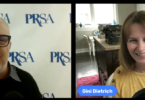A recent blog post by Neville Hobson, co-host of the popular industry podcast “For Immediate Release,” discussed an issue that has often been the bane of public relations: e-mail spam. Specifically, Hobson noted how detrimental an apparent increase in the amount of off-topic and unsolicited blast e-mail pitches are having on the perceived value of public relations among reporters, bloggers and the business community.
The post was prompted — in part — by a recent initiative from our friends at the UK-based Chartered Institute of Public Relations (CIPR), which has released a Media Spamming Charter, in conjunction with the Public Relations Consultants Association, the Investor Relations Society and supported by the UK’s National Union of Journalists. The Charter is meant to be a guide to CIPR members and the public relations profession on standards of conduct when working with the media and bloggers.
From PRSA’s perspective, this Charter represents a common-sense approach to media relations, and is a valuable reminder for practitioners that interactions and communications with members of the media should be approached in a respectful, genuine and ethical manner.
The reality is that spamming the media, unfortunately, has taken place since well before e-mail was widely used. PRSA, along with the CIPR, Council of PR Firms and other organizations representing the profession, share in the responsibility to properly educate and inform practitioners of best practices and ethical standards in media relations.
Until practitioners and agencies stop measuring the “success” of their public relations campaigns via impressions and AVEs, the use of spam e-mail pitches and disingenuous media relations tactics is unlikely to stop. While PRSA, the CIPR and the Media Spamming Charter all take an active role in educating the profession on best practices, it requires both an individual and collective responsibility to end these unprofessional media practices.
Ultimately, the value of public relations — and of our relationships and communications with reporters and bloggers — comes down to measurement. PRSA’s signature on the Barcelona Principles and new partnership with AMEC will help the industry move away from metrics that perpetuate the “spray and pray” approach.
We are finally in an era where the true measure of success for public relations comes from helping to build brands and businesses, rather than securing column inches or telling a client you sent 100 pitches last week to top-tier media.
Clearly insidious and unsolicited spam won’t result in any success for a client. In fact, as Mr. Hobson pointed out, it has an adverse effect.
The best practices for media relations presented in the Media Spamming Charter, along with PRSA’s professional development seminars on media relations and agency-specific education sessions for employees, must be taken seriously by individuals and their employers and instituted throughout their work. Anything short of this will diminish our efforts to offer strategic and valuable counsel to clients.
We all share the responsibility to foster mutually-beneficial relationships with the media via ethical media relations practices.
Gary McCormick, APR, Fellow PRSA, is chair and CEO of PRSA and director of partnership development at HGTV in Knoxville, Tenn.







You can have as many charters as you like, but it’s a bit like a widget on a website – anyone can have them.
I’d love to see something that actually means something – a low entry level (in terms of cost) kind of ‘kitemarking’ that ensures that PRs are fit to practise, that embraces all the different kinds of PR – something you’re proud to earn, but which can be lost if you stray too far from the paths of righteousness!
Thanks for contributing to this discussion, Gary, with some excellent points and a very clear focus on the PRSA’s position with regard to PR spam. I appreciate your reference to my own post on the matter and the CIPR’s charter, thanks.
Frankly, I would have been very surprised indeed not to have read the PRSA’s views on the matter as you’ve articulated them. I agree with your well-made points concerning ethical behaviour and the lead professional bodies such as PRSA and CIPR ought to take to foster and support best-practice behaviours in the profession.
We talked about this issue in the last episode of the FIR podcast on Oct 4. In light of your post, we’ll have a follow up in the next episode on Oct 11.